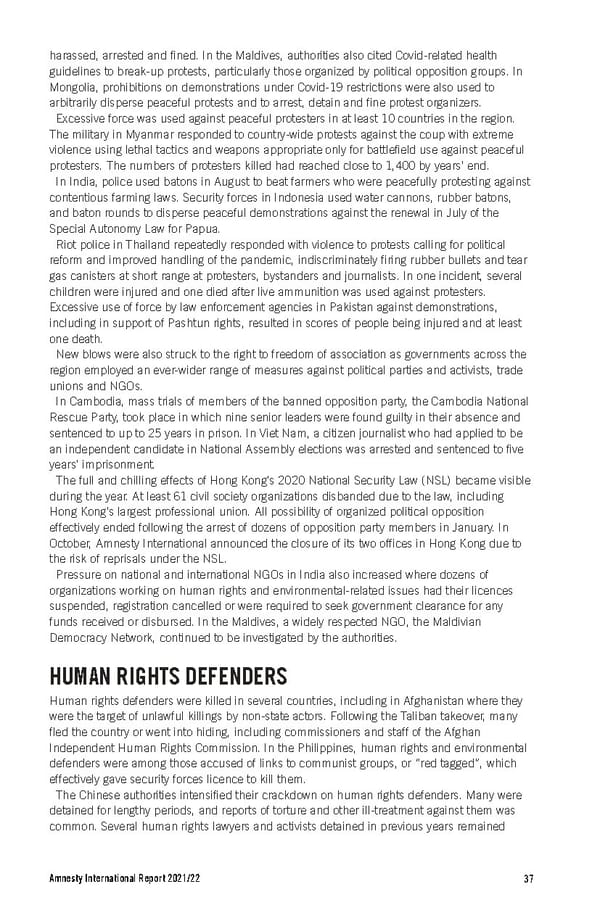harassed, arrested and fined. In the Maldives, authorities also cited Covid-related health guidelines to break-up protests, particularly those organized by political opposition groups. In Mongolia, prohibitions on demonstrations under Covid-19 restrictions were also used to arbitrarily disperse peaceful protests and to arrest, detain and fine protest organizers. Excessive force was used against peaceful protesters in at least 10 countries in the region. The military in Myanmar responded to country-wide protests against the coup with extreme violence using lethal tactics and weapons appropriate only for battlefield use against peaceful protesters. The numbers of protesters killed had reached close to 1,400 by years’ end. In India, police used batons in August to beat farmers who were peacefully protesting against contentious farming laws. Security forces in Indonesia used water cannons, rubber batons, and baton rounds to disperse peaceful demonstrations against the renewal in July of the Special Autonomy Law for Papua. Riot police in Thailand repeatedly responded with violence to protests calling for political reform and improved handling of the pandemic, indiscriminately firing rubber bullets and tear gas canisters at short range at protesters, bystanders and journalists. In one incident, several children were injured and one died after live ammunition was used against protesters. Excessive use of force by law enforcement agencies in Pakistan against demonstrations, including in support of Pashtun rights, resulted in scores of people being injured and at least one death. New blows were also struck to the right to freedom of association as governments across the region employed an ever-wider range of measures against political parties and activists, trade unions and NGOs. In Cambodia, mass trials of members of the banned opposition party, the Cambodia National Rescue Party, took place in which nine senior leaders were found guilty in their absence and sentenced to up to 25 years in prison. In Viet Nam, a citizen journalist who had applied to be an independent candidate in National Assembly elections was arrested and sentenced to five years’ imprisonment. The full and chilling effects of Hong Kong’s 2020 National Security Law (NSL) became visible during the year. At least 61 civil society organizations disbanded due to the law, including Hong Kong’s largest professional union. All possibility of organized political opposition effectively ended following the arrest of dozens of opposition party members in January. In October, Amnesty International announced the closure of its two offices in Hong Kong due to the risk of reprisals under the NSL. Pressure on national and international NGOs in India also increased where dozens of organizations working on human rights and environmental-related issues had their licences suspended, registration cancelled or were required to seek government clearance for any funds received or disbursed. In the Maldives, a widely respected NGO, the Maldivian Democracy Network, continued to be investigated by the authorities. HUMAN RIGHTS DEFENDERS Human rights defenders were killed in several countries, including in Afghanistan where they were the target of unlawful killings by non-state actors. Following the Taliban takeover, many fled the country or went into hiding, including commissioners and staff of the Afghan Independent Human Rights Commission. In the Philippines, human rights and environmental defenders were among those accused of links to communist groups, or “red tagged”, which effectively gave security forces licence to kill them. The Chinese authorities intensified their crackdown on human rights defenders. Many were detained for lengthy periods, and reports of torture and other ill-treatment against them was common. Several human rights lawyers and activists detained in previous years remained Amnesty International Report 2021/22 37
 Amnesty International Report 2021/22 Page 36 Page 38
Amnesty International Report 2021/22 Page 36 Page 38